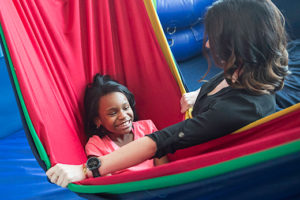The ability to learn how to independently play is a skill children acquire at an early age. Independent play does not always come naturally for children with autism and other developmental delays. Play is more than just having fun and has a variety of benefits to children’s development and growth. Caregivers and therapy providers can provide additional support to teach children independent and interactive play skills.
Understanding Our Children
Playing independently can be challenging for some kids. Children can learn to play by mimicking and imitating peers, siblings, caregivers, and others when engaging in different forms of play. However, imitation skills can be delayed for children with autism. Therefore, they may not pick up those imitation skills as easily.
Play Helps Children Learn:
- Motor Skills
- Social Skills
- Emotional Development
- Executive Function Skills

Types of Play:
- Exploratory play- (also known as sensorimotor play) getting your child out in nature, varying the sensory experience of their toys, and being mindful of your child’s body language and cues.
- Cause and effect play- engaging with toys in order to lead to a specific result. Start simple, show them the way, use various toys, talk through the process with them.
- Parallel play- children playing in their own preferred play next to a peer. Schedule parallel play time, approach slowly, and provide an outlet of opportunities for your child.
- Toy play- can help children develop problem solving skills and improve creativity. Provide opportunities with a variety of toys, as well as offer two-to-three choices of toys, and allow your child to be creative.
- Constructive play- children build and create things using blocks, play-doh, legos, puzzles, ect. Be mindful of your child’s limits as children with autism may experience sensory overload. Start slow and build up their skills and you can use fun and safe household items.
- Physical play- running, jumping, skipping, and playing at the park are all forms of physical play. Go outside when possible and create fun obstacle courses.
- Pretend play- using imagination in play activities. Playing “house” or dress up can be a form of pretend play. Model simple, everyday actions around the house and prompt your child to copy you. You can make it silly as well as use their favorite movies or TV shows.
More Tips For Independent Play:
- Take it one step at a time.
- Build on their interests.
- Allow them to lead.
- Model the activity first and give them time to imitate.
- Praise and reinforce independent play skills.
- Break down steps into small components.
- Build on their strengths.

Eyas Landing is a therapy clinic with a mission to provide evidence-based and family-centered therapy services for children, adolescents, and their families. The primary goal is to deliver relationship-based interventions within the most natural environments and to empower families to reach their full potential. To achieve this goal, our highly educated, compassionate staff dedicates time and expertise to create experiences that maximize therapeutic outcomes. The strength, determination, and perseverance of our clients are evident as they succeed in therapy, and ultimately in their daily lives.
Eyas Landing offers a wide range of comprehensive services including Speech Therapy, Occupational Therapy, Physical Therapy, ABA Therapy, Social Work, Family Therapy, and Neuropsych testing. Services are provided throughout the Chicagoland area via Telehealth, In-Home, and in our state of the art clinic.
Want to learn more or you have a specific question? Feel free to connect with us here!



